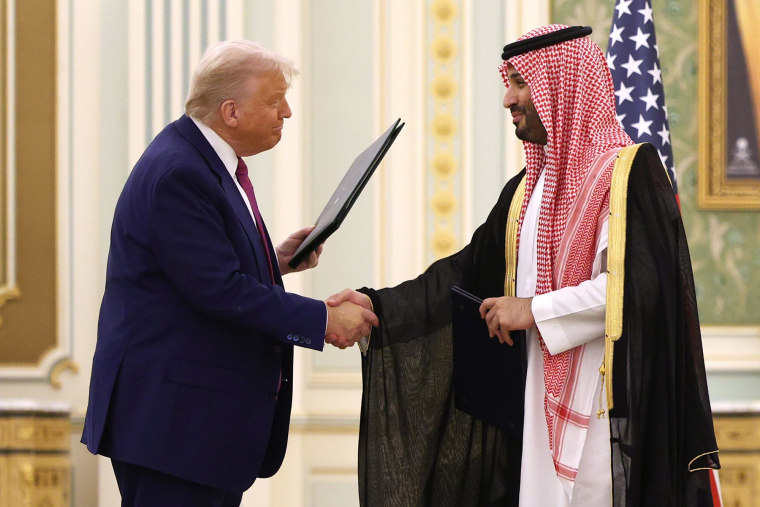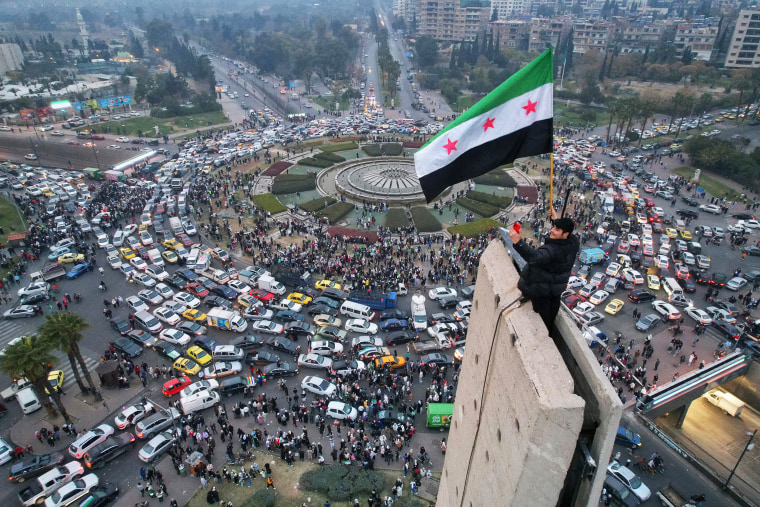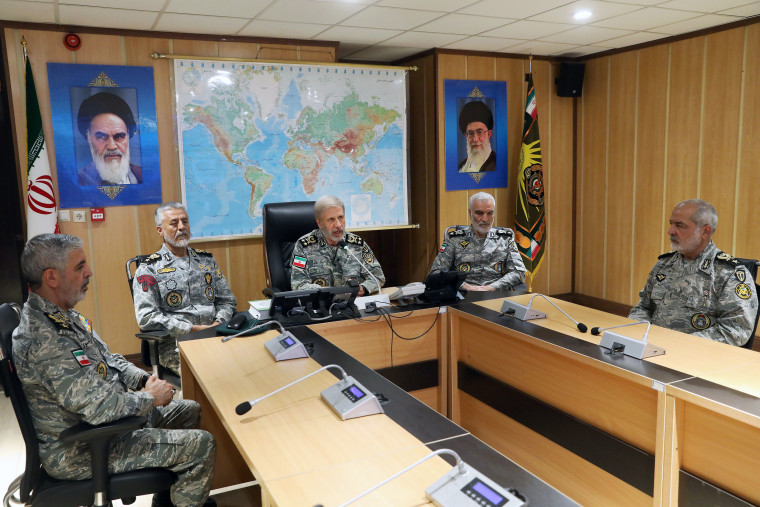TEL AVIV — If Iran had hoped its neighbors would rise to its defense in the wake of unprecedented American and Israeli attacks, that moment may have passed.
On Monday, Iran fired back at the U.S. with a strike on the American Al Udeid Air Base in Qatar, in what is already being seen as merely a face-saving gesture. Qatar said it had intercepted the Iranian missiles and condemned the attack, calling it a violation of its sovereignty.
But even as Middle Eastern leaders were quick to criticize President Donald Trump’s paradigm-shifting assault on Iran following 10 days of Israeli bombardment, the American strikes are likely to be accepted — and even privately cheered — by an Arab officialdom that has long seen Shia Iran as the primary threat to regional stability.
“These countries are quietly delighted to see Iran cut down to size,” said Firas Maksad, the managing director for the Middle East and North Africa at the Eurasia Group. “But the primary objective is to guard against blowback targeting them.”
Statements from the governments of Turkey and Saudi Arabia, for example, have stopped short of condemning the U.S. attacks on Iranian nuclear facilities, instead only issuing expressions of concern over an expanding regional conflict.
The statement from Qatar and the United Arab Emirates didn’t even mention the United States by name. The most recent comments contrast with the countries’ strong condemnations of Israel’s attacks on Iran over the past 10 days.

“It speaks volumes about how they are very careful not to cross President Trump,” Maksad said. “But also a deep desire to continue to play facilitator and mediator.”
For generations, Iran has cultivated powerful proxy organizations throughout the Middle East, such as Hezbollah in Lebanon, the Houthis in Yemen, militant groups in Iraq and the regime of Bashar al-Assad in Syria, whose focus on threatening Israel have promoted instability in their host countries.
The Islamic Republic’s oft-stated ambition to “export” its 1979 Islamic Revolution has long worried its neighbors, particularly those whose populations include sizable Shia minorities who have long felt aggrieved by the region’s mostly Sunni Muslim leaders.
The Arab-Iranian cold war has been a primary factor behind Israel’s increasing diplomatic coziness with its Arab neighbors, who have largely shelved generations of anger against the Jewish state in order to check Iranian power.
Trump’s signature foreign policy achievement of his first term, the Abraham Accords that normalized Israeli diplomatic relations with several Middle Eastern countries, was born from Gulf Arab governments’ mounting anxiety over expanding Iranian influence.
Since Hamas, also an Iranian proxy, attacked Israel on Oct. 7, 2023, Israel has virtually destroyed nearly all of those groups aligned with Iran, neutering the primary threat against the Jewish state. The Syrian regime of Bashar Al Assad, which Iran helped to prop up during its decade-long civil war, was overthrown late last year.

The regional view of Iranian influence already played out in miniature in Lebanon.
Israel’s highly destructive dismantling of Iranian influence in Lebanon was quietly welcomed by those outside the group’s base of Shiite supporters even as Lebanese leaders continued to publicly oppose Israel and champion the Palestinian cause.
Lebanese Hezbollah, a militant group that was lavishly financed and started in part by the Islamic Republic, has not publicly committed to involve itself in this latest escalation between Israel and Iran. A statement from Hezbollah on Sunday night praised its patron state’s courage and resilience, while making subtly clear that Iran will have to stand on its own.
“[Iran is] capable of confronting this aggression and delivering a bitter defeat to the American and Zionist enemy,” Hezbollah said.
Over the past year, Iran watched from the sidelines as Israel overran Hezbollah’s power base in southern Lebanon, assassinated most of the group’s leaders, destroyed its painstakingly built military infrastructure and killed thousands of Lebanese civilians.
Hezbollah “very much feel that they paid an extremely high price in the last round of fighting between Hezbollah and Israel,” Maksad said. “Iran was nowhere to be seen. So there’s this very strong sentiment, including among Lebanese Shia, that Iran abandoned them at their time of need.”
Syria’s new leader, Ahmad al-Sharaa, ousted the Iran-backed Assad regime last year and has since made public entreaties to the Trump administration and even signaled a willingness to ease tensions with Israel.
The main concern for Arab leaders in the short term is that Iran could decide to retaliate against them or the huge American military installations they host.
Yoel Guzansky, a senior fellow at the Institute for National Security Studies, who helped coordinate Iran and Gulf affairs at Israel’s National Security Council, said he expects Iran to execute a “face-saving” response similar to its retaliation after the Trump administration assassinated the Islamic Revolutionary Guard Corps' commander, Gen. Qassem Soleimani, in 2020.

Days after the U.S. killed Soleimani in Iraq with a drone strike, Iran fired ballistic missiles at two American bases in Iraq that left 110 service members with traumatic brain injuries.
An Iranian attack on America’s monied Gulf Arab allies could also risk drawing the U.S. further into a Middle East war, as Arab states may expect the U.S. to defend them, he said.
“If something happens, they expect the U.S. to safeguard their security,” Guzansky said.
Top of mind will be attacks by the Iran-backed Houthi rebels in Yemen on a Saudi energy facility in 2019. Though the Houthis claimed responsibility, the U.S. and Saudi Arabia blamed Iran for the drone attack that killed four civilians and briefly shut down operations at the enormous Saudi Aramco facilities at Abqaiq.
Arab leaders’ assessment could also change sharply if the U.S. decides to pursue regime change in Iran.
Some of the richest Gulf Arab countries, such as Bahrain and Saudi Arabia, will worry that the destabilizing effects of a heavy-handed regime change could stir their own sizable and restive Shia Muslim populations.
“They don’t like this regime but they fear a chaotic and even worse regime,” Guzansky said of Gulf Arab leaders. Iran is “not that stable but the regime has not collapsed. Iran is like a wounded lion. For the Gulf states, that’s dangerous.”
